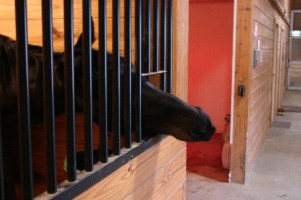Celeste Crisman, Extension Horse Specialist, Virginia Tech
Although the horse’s usual first response to unfamiliar things is flight or fight, its second response is usually curiosity. Horses use all of their senses to investigate their world. During investigation, they tend to be very alert, excitable and ready to flee at any hint of danger. After all, there could be a predator hiding in the object they were examining.
Curiosity is part of the horse’s natural behavior and managers must recognize this and take steps to reduce accidents caused by curiosity.
- Pastures should be kept clear of farm equipment, trash and junk piles, and pasture fences should be well-maintained and constructed of the safest material available.
- Installing electric tape inside existing fences is a good safety feature because it teaches curious horses to stay away from the fences.
- Gates, feed rooms, and stall doors should be kept securely fastened, and halters should be removed when horses are stalled or turned out.
When a curious horse does get in a potentially dangerous situation, calm, methodical handling will reduce the horse’s tendency to panic and flee.



